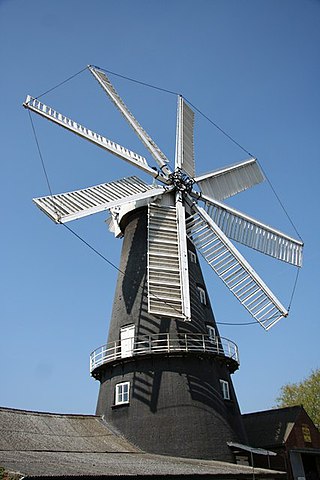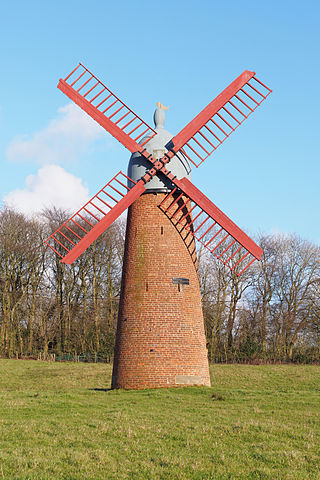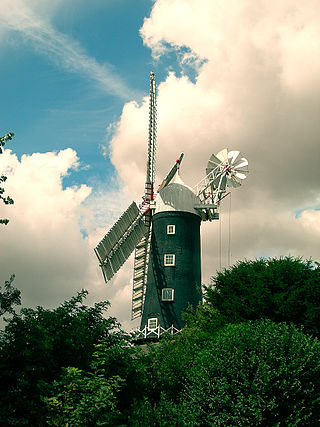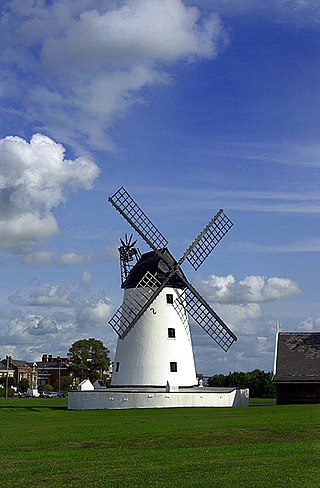
Mount Pleasant Mill is a windmill north of Kirton in Lindsey on the North Cliff Road in North Lincolnshire in the east of England.

Heckington Windmill is the only eight-sailed tower windmill still standing in the United Kingdom with its sails intact.

Alford Windmill is a five-sailed windmill in Alford, Lincolnshire and the only surviving windmill out of four. Though the windmill has been restored to working order, it no longer supplies flour for sale.

The Wilton Windmill is a five-floor brick tower mill, standing on a chalk ridge between the villages of Wilton and Great Bedwyn in the southern English county of Wiltshire.

Maud Foster Windmill is a seven-storey, five sail windmill located by the Maud Foster Drain in Skirbeck, Boston, Lincolnshire, from which she is named. She is one of the largest operating windmills in England being 80 feet (24.38 m) tall to the cap ball.

Moulton is a village in the civil parish of The Moultons, in the South Holland district of Lincolnshire, England. It is situated on the A151 and B1537 roads, 5 miles (8.0 km) east from the centre of Spalding and 3.5 miles (5.6 km) west from Holbeach.

A tower mill is a type of vertical windmill consisting of a brick or stone tower, on which sits a wooden 'cap' or roof, which can rotate to bring the sails into the wind.

Waltham Windmill is a six-sailed windmill located in the village of Waltham, five miles from Grimsby in North East Lincolnshire, England. It is renowned in the area for having all six sails still in full working capacity, being one of the very few windmills like this in the United Kingdom.

Metheringham Windmill, locally known as The Old Meg Flour Mill, was a six-storeyed, six-sailed, and tarred slender Lincolnshire type windmill with the typical white ogee cap and fantail. The mill is derelict.

Sibsey is a village, civil parish and electoral ward in the East Lindsey district of Lincolnshire, England. It is situated at the junction of the A16 and B1184 roads, 4 miles (6.4 km) north from Boston. Sibsey Northlands is to the north of the village. The Prime Meridian passes just to the west of Sibsey, crossing the Stone Bridge Drain canal. At the 2001 census, Sibsey had a population of 1,996, reducing to 1,979 at the 2011 Census.

Green's Windmill is a restored and working 19th-century tower windmill in Sneinton, Nottingham. Built in the early 1800s for the milling of wheat into flour, it remained in use until the 1860s. It was renovated in the 1980s and is now part of a science centre, which together have become a local tourist attraction.

Moulton Windmill in the Lincolnshire village of Moulton, between Spalding and Holbeach is a restored windmill claimed to be the tallest tower mill in the United Kingdom.

Denver Windmill is a Grade II* listed tower mill at Denver, Norfolk, England. In March 2010, there were about 374,000 list entries of which 5.5% were Grade II* and even fewer were superior.

West Blatchington Windmill is a Grade II* listed smock mill at West Blatchington, Brighton and Hove, in the historic county of Sussex, England which has been restored and is open to the public.

Stone Cross Windmill is a grade II* listed tower mill at Stone Cross, East Sussex, England which has been restored and is open to the public. The mill was also known as Blackness Mill and the White Mill.

Skidby Windmill is a Grade II* listed windmill at Skidby near Beverley, in the East Riding of Yorkshire, England.

Pakenham Mill is a Grade II* listed tower mill at Pakenham, Suffolk, England which has been restored and is maintained in working order.

Holgate Windmill is a tower mill at Holgate in York, North Yorkshire, England which has been restored to working order.

Quainton Windmill is a historic windmill in the village of Quainton, Buckinghamshire, England, United Kingdom.

Lytham Windmill is situated on Lytham Green in the coastal town of Lytham St Annes, Lancashire, England. It is of the type known as a tower mill and was designed for grinding wheat and oats to make flour or bran. Since commercial milling on the site ceased in 1921 the mill has belonged to the town and is operated by Fylde Borough Council, who open it to the public during the summer. The mill also contains a museum run by the Lytham Heritage Trust which explains the history and practice of flour milling.




















